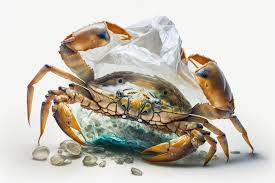Grace had grown up obsessed with the ocean, which was why she had studied marine biology in college. Everything she had learned in school ultimately led her to the same hopeless conclusion: the plastic pollution problem was too vast and too overwhelming for any individual to make a meaningful impact. But then, after graduation, Grace had stumbled upon an unexpected solution that would change not only her life, but the world as well.
It started when she was walking along the beach one day, watching as the waves deposited handfuls of microplastics onto the shore. She had a sudden urge to pick them up and dispose of them properly, but as she looked around at the miles and miles of beachfront, she knew it was a futile effort. And that was when she saw it: a tiny crab, struggling to move along the sand with a plastic fork wedged in its shell. The sight of this helpless creature, so visibly affected by human waste, stirred something deep within Grace.
She returned to the beach the next day, armed with gloves and trash bags. And then the next day, and the next. Soon, she had a small army of volunteers joining her, and they began to amass huge piles of plastic waste on the beach. But Grace knew that cleaning the beaches was only a temporary solution. The real problem lay deeper: in the systemic overuse of plastic in everyday products. That was when Grace started working with manufacturers, showing them how they could substitute single-use plastics for alternatives that were both more eco-friendly and more sustainable. It was a slow and challenging process, but Grace was relentless in her pursuit of change. She also began educating the public about the importance of reducing their plastic consumption. With a forceful voice and an unyielding determination, she travelled the world, speaking at schools and community centres, showing people how they could make small changes in their everyday lives that would ultimately have a huge impact on the environment. It wasn't easy, of course. The plastics industry was powerful, and there were powerful interests arrayed against her. But Grace refused to be intimidated, and she refused to be silenced. Years went by, and Grace watched as the tides began to turn. More and more companies started incorporating eco-friendly materials into their products, and consumers became more conscious of their plastic use. Grace knew that there was still a long way to go, but she was heartened by the progress that had been made.
One day, years later, Grace was sitting on the beach where she had first seen the crab with the plastic fork in its shell. The sand was clean now, and the ocean was a deep turquoise. In the distance, she could see a pod of dolphins playing in the waves. She smiled, knowing that the oceans were still alive and that there was still hope for the planet. And as she sat there, listening to the sound of the waves, she knew that it had all started by simply picking up a piece of plastic on the beach.
Article | Research Details
- Home /
- Article | Research Details


Freepik.com